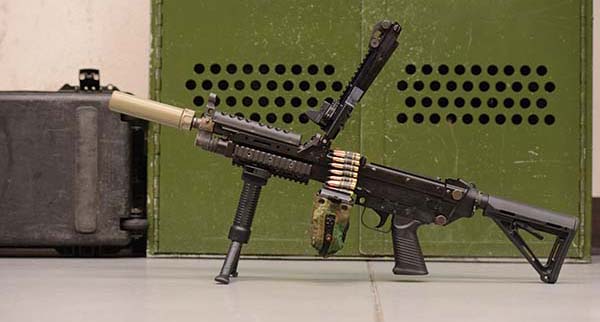ABOVE: Firing the MGA SAW K in .300 Blackout from an overlook in the badlands of Utah.
“Squad Automatic Weapon”- the “SAW.” The phrase has meant many different things to people over the years. Older veterans will consider that a SAW has to be in .30 caliber so it can work a beaten zone out at 1000 yards. Defilade, enfilade, grazing fire, plunging fire, and suppressive fire on assault or effective cover for your platoon to unass an AO gone bad. The Browning 1919A4, M60GPMG, MAG58, PKM all come to mind as Squad Automatic Weapons. In the 1970s, the US and NATO moved away from that idea, planning 6mm or 5.56mm belt feds to lighten the load and spread the wealth a bit more- allowing easier access to belt fed fire in the line. The Communist Bloc had already done this with the RPD, and drum fed RPK, both in 7.62x39mm and RPK-74 in 5.45x38mm. Grumpy old soldiers considered these new 5.56mm belt feds nothing more than automatic rifles, great for close in firepower but not capable of the longer range fighting the “SAW”
required as a tool.
Combat has proven that to be somewhat of a falsehood, and the FN Mimimi, the M249, the Negev, and other 5.56mm belt feds have done the job and proven to be excellent fighting tools for the soldiers. It is true that in Afghanistan and Iraq fighting, the 5.56x45mm round was not the optimum at longer ranges. There is always the nagging thought in the back of people’s minds that they’d like to have a heavier caliber- more reach, more hitting power, more options, but staying in a smaller package. FN’s MK48, and the lightweight M240 variants from FN and Barrett are opening doors at longer ranges, and of course US Ordnance’s M60E6 is crossing the weight/range barrier. All fine products for today’s warriors.
What we’re looking at in the MGA SAW series of multi-caliber belt feds is an entirely different creature, which provides a myriad of options and choices of caliber. Not your father’s (Or grandfather’s) SAW.
US Machine Gun Armory, LLC is one of the newer companies in the belt fed market- innovative and focused on making one product with many different features- the MGA SAW. John Kokinis, Director of Research & Development of MGA, first appeared on the small arms scene about ten years ago- this author was on a trip into Serbia and John traveled there as well, to fire many different weapons that were not available in the US. We piled up the brass in Cacak, and spent many hours discussing mechanisms, calibers, and historic designs with other knowledgeable small arms experts. He was focused at that time on learning about all of the designs that he could. The fact is, that even then John Kokinis’ dream was to make a belt fed machine gun that met all the needs of the modern battlefield. He spoke about multiple calibers, compact size, and maintaining a long reach with a highly reliable package.
SADJ will be performing a full MilSpec test on the MGA SAW in the future, and we have some other articles planned on MGA’s products. Kokinis offered us the opportunity to have a quick preview at the range with the MGA SAW K- the short version, at a local range. With an offering of calibers to choose from, we asked for .300 Blackout subsonic, 5.56x45mm, and 7.62x51mm. MGA also offers 5.45x39mm, 6.8mm SPC with new links, 7.62x39mm, and .260 Remington. All of these calibers can be fired from the same base weapon by changing out barrel, bolt and a few other parts as needed.

Matthew Supnick, Operations Manager at Battlefield Vegas, invited SADJ to bring MGA over and have our test firing at their indoor Las Vegas facility. I mention “indoor” because Ron Cheney recently told SADJ that they had a new 160 acre outdoor range and facility near Las Vegas and it would be opening soon.
The MGA SAW K fired reliably and was very controllable for all of the testers who tried it. 5.56x45mm and 7.62x51mm were as expected, with the 7.62 being a bit of a surprise at how controllable it was. The real star of the show was our desire to fire it in .300 Blackout in both supersonic and subsonic levels. MGA’s design is to simply switch out a barrel for the subsonic- easy to do, and keeping the suppressor on it gives the operator a dedicated super-quiet belt fed at easy access. We had no malfunctions in either level of .300 blackout, and this was clearly an easy to control and very accurate machine gun.
We’re looking forward to our full MilSpec test on the MGA SAW series, and will bring the readers a more in-depth report on the MGA SAW very shortly.
Machine Gun Armory
www.machinegunarmory.com
Battlefield Vegas
www.battlefieldvegas.com














